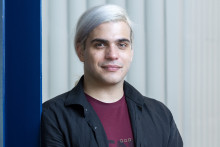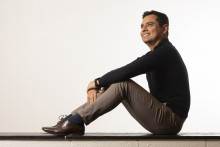Vasileios Trikalitis
PhD research topic: Utilizing 3D bioprinting technology for the purpose of storable, vascularized artificial tissue constructs
Works at: Engineering Organ Support Technologies, Faculty of Engineering Technology
Studied: Biomedical Engineering at the University of Twente
Originally from: Greece
‘I essentially have three jobs. I’m Product Innovation Manager at a UT spin-off IamFluidics. I’m a co-founder and director of Authentia foundation dedicated to Greek students and alumni in Twente. And I’m doing my PhD focused on tissue regeneration.
I’ve known that I wanted to do a PhD since I was very young. Thanks to a relative who was a surgeon, I was able to attend and observe a surgery when I was thirteen. The bones in the patient’s hand were completely shattered and I witnessed how the surgeons reconstructed the hand using fabricated pieces of plastic. The idea of using non-living things inside living things was just mind-blowing for me! And I immediately knew that I wanted to become the person that designs those blocks and improves them. I went on to study Material Science with focus on implants and soon realized that you need to include living cells in your implant in order to someday really restore function of damaged tissue. That is why I became a salesman for a while, saved some money for my studies, and was able to come here to the UT to study Biomedical Engineering.

My PhD aims to use 3D printing to make blood vessels for the fabrication of heart tissue. Developing blood vessels is crucial. Without it, replacement of big tissue and organs is not possible – without blood vessels that bring oxygen and nutrients, the tissue will die. I have been able to develop a method that, so far, seems promising. We’ve created 3D printing inks made of hydrogel microparticles that can allow blood vessels to grow in between their cracks, similar to how trees grow roots in the ground. Our method is patented and it is scalable. The vision is to produce these 3D structures in a factory, dry them and transport them to the clinic where the surgeon can apply it in a patient. I’m currently busy with applying for funding and would love to start a new company with this technology.
‘Technology developed by scientists should be brought to the market by the scientists’
I strongly believe that technology developed by scientists should be brought to the market by the scientists themselves. The University of Twente got that right. To have a truly successful company, to create a unicorn, you have better chances if you help scientists to also become businessmen.’
‘I’m now writing my thesis and finishing my PhD. I’m running overtime because of my position at IamFluidics and because patenting takes a lot of time. I have two patents with my name and now we’re finishing the third one. I’m passionate about my research. I’ve always wanted to help make humans better. With biomedical engineering, you can even design better organs. Imagine designing a heart that has a special nerve that clearly signals when you are having a heart attack. That sounds like science-fiction right now, but we are designing tissue from scratch, so it is the next logical step to improve functionality. I find that very exciting.

Other than that, doing a PhD has been horrible for me! The problem with doing a PhD is that if you fail, you are the only one who loses. And people seem to realize that very well. As a doctoral candidate, you have to work on your research, design experiments that are novel, help with teaching, supervise students, do all the ordering and also function as a technician, because there aren’t enough technicians on staff here. It’s exhausting and it burns PhDs and postdocs out. You have four years when you simply cannot fail. If you’re in biomed, you spend a lot of time in the lab. Long days, weekends. Especially if you work with cell cultures, because those need attention every day. On top of that, there is a lot of competition between groups and scientists.
‘It’s exhausting and it burns PhDs and postdocs out’
Yet, the support at the UT is better than at other universities. I spent some time at other institutions and let’s just say, the UT is the best so far. The UT also offers a great foundation for employees. You can get funding to start initiatives that will improve the community. That’s just amazing!’
‘I’m at the last stage of my doctoral research and I have already secured a Postdoc position here at the UT. But I know I will probably not become a professor. I find that extremely inefficient for what I am aiming for. As a professor, you do not get rewarded or evaluated for developing technology that will actually make it to the society. The impact factor of papers will not change the real world, and while scientific advancement and impact is necessary, I just want to make technologies that can make it to people.
It's always scientists who solve the problems. Whether those are STEM related or not. Just look at the Covid-19 pandemic. It was scientists who gave us the tools to counteract it. Thanks to science, for the first time in history, during a pandemic we knew how viruses work, how viral particles spread, how transmission can be reduced and how to create a vaccine. That is the power of science. Yet, the vaccines were brought to us by small spinoff companies made by scientists. Science also needs the capital and the logistics to scale. I think that it’s scientists, technocrats with business skills, who are the true agents of change.’








